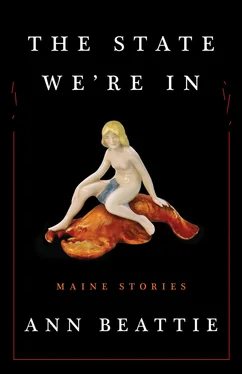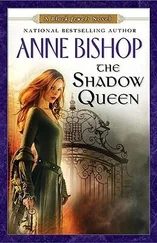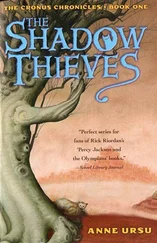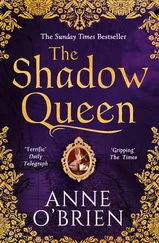I nodded. It was Kennedy, but it seemed like something Nixon would do.
“That was their best thought!” Duff said, loudly. “So a bunch of turtles… I mean, tortoises. My father taught me the distinction: tortoises. What I’m saying is, there was a big conference in the Galápagos, and they were sleeping in the sun or crawling their ten inches a day, or standing up, looking left and right, and plopping down again, wired for sound!”
“My fine neighbor, you are full of surprises,” Mrs. Terhune said.
“That writer fellow, he happened to be an acquaintance of my father. You might ask, where would my father encounter the dashing Bruce Chatwin? Well, it was on faraway soil, where his Sherpa knew the Sherpa who was taking some Brits on a hike, and they thought in their Sherpa way that maybe they could lead the two expeditions together. One of the hikers was an English writer, name of Chatwin. When he and my father met, he was astonished at my father’s age. Said he didn’t look a day over sixty. Had some reluctance about letting the Sherpas get off easy, but they did agree they’d join up. But on the second day one of the men fell ill and had to be airlifted out with a ruptured appendix, so First Sherpa went ahead. Anyway, that first night, my father talked old age and dengue fever and London bars with Bruce Chatwin, who fell ill himself in the 1980s, but by then my father didn’t read the paper, and except for reading In Patagonia , I don’t think he ever read another of his books. I can’t be sure of that. Anyway, my father — as you surely remember, Muriel — was always fired up about something or somebody, and for a while it was nothing but Chatwin, Chatwin, Chatwin. When he died, I wrote a note to Mrs. Chatwin, telling her how much that one meeting meant to my father and saying that if she remembered ever hearing about a Charles Manley Arthur Bromwell, that was my late father, who died at the age of one hundred and three.”
Mrs. Terhune turned to me, the fingers of her free hand rubbing the warm mug. She said, “One time Mr. Bromwell was all fired up about digging a new well, and he had a dowser come, a famous one, who charged by the day. He looked and he looked. He couldn’t find anything. So another dowser was called in, and bingo! He knew where to drill, but on drilling day, who should show up but Dowser Number One, who stood there disagreeing with where the dig should begin. He’d had a dream that he woke up from with tingling fingertips, he said, which had happened to him ten times previously, and every single time he’d been right: he’d envisioned the property in his dreams, and his fingertips had started to tingle, so that when he sat up in bed, he was pointing toward some part of the scene that remained as clear to him as if he were watching a movie. Then he’d sort of sleepwalk toward it — a gulley or a shaded area under oak trees — and his fingertips would turn hot and stop having that funny feeling, but when the digging began, it was always the right place.” She turned toward Duff Moulton. “So, Chip — I mean, Duff: your late father, I believe he came up with the solution of not having either of the dowsers work for him, because he thought the man with the itchy fingers was clearly crazy, yet he’d cast enough doubt that he didn’t want the other guy doing the work, either. When the well ran dry, someone else in the family called in the person who drilled a new one, so a well did get drilled successfully while Mr. Bromwell was still with us.”
“If you don’t think it’s too forward of me, Mr. Moulton, how is it that your father was named Bromwell, and you Moulton?” I asked.
“Not forward, at all! Don’t they complain that young people never ask questions? I was the first and last baby born to my parents, and my mother could never have another because they had to remove her inner workings when I was born. She was so sad, she cried for days, and finally my father said, “Well, why not name him for your side of the family, since we don’t want the Moultons to die out.” He cleared his throat and pretended to switch the tobacco plug from one cheek to the other. “That was a little joke. The Moultons aren’t about to die out. Not before the Smiths do, anyway. All of that might take another meteor. But anyway, he was an enlightened man, or at least an unusual one. He’d get a gold medal now from the women’s liberation front.”
I looked at Mrs. Terhune. I suspected I shouldn’t correct him and say he shouldn’t say “front.” I don’t know why I bothered to send her a silent look, because she wasn’t the kind of woman to return another woman’s glance, and if a man looked at her for agreement, she’d only squint.
So that was more or less my evening with my landlady and the neighbor. Enough information was revealed to provide me with material for several books. Anyone prudent would have asked if they’d mind being recorded, but it wasn’t until the next day that this possibility hit me, and then — in spite of being a bit shy — I went first to Mr. Moulton and asked, calling what he’d provide “an essential oral history,” and also flattering him — I hoped I wasn’t frightening him — about using his stories in my writing, someday. I figured that if I went to him first, Mrs. Terhune might also agree, but I missed my guess. “You go ahead and put your recorder in my fine neighbor’s house, if he agrees, but I don’t hold with wiring turtles or setting up a machine to talk into every time a thought pops into my head. No, I wouldn’t want to sit around and do that. Most things are best forgotten. With that Shackleton man, you’ve got enough information to write for a lifetime! You go ahead and record Chip, I mean Duff, but Duff’s done enough. You’ll have to excuse me for saying no.”
Mrs. Terhune — in fact, everyone in New England — was unwilling to rethink anything, so that was that. I thanked her and made plans to proceed with Duff (as he asked me to call him). I drove to Radio Shack to see what I could buy to make the recordings. I wanted something a little old-fashioned so it wouldn’t put him off. In the back, they found a machine that took cassettes, of which they had a plentiful supply. The salesman, who looked about sixteen, was amazed at what the older salesman had managed to put his hands on. He examined all of it as if it were dinosaur dung. I drove home so excited; I could hardly believe what I’d stumbled into. This was the expedition that would go right. The dogs (that would be me) would prance forward effortlessly, devoted to their task. Soon we’d glide through to beautiful spring weather, day after day, until we arrived at our destination. Of course, I suspected that my unstated goal was to stop writing my book. That something about Duff and the new project was subversive, as well as extraneous. I almost had a first draft, and as any writer knows, once you have that the going gets easier. Then it’s just editing: adjusting, adding the better word here and there, finding the perfect phrase, the enlightening metaphor, taking away the drift of words that have become too plentiful on the snowy white page. The new book might be better — much better — but it was a distraction from my story, the one I’d been moving forward with for years, in self-imposed near isolation, with only a radio to bring in Mozart to brighten the dark days.
Fate fooled me. Duff moved in with Mrs. Terhune, and together they agreed that I should finish the book I was writing and maybe, maybe we’d talk later, if summer wasn’t too busy. He did not romantically move in with Mrs. Terhune. He did the sensible, New England thing of doubling up. He’d turn off the heat in his house and drain the pipes, and together they’d adequately heat her house, and split the bill. It was as if they’d just been waiting to be better friends and I’d facilitated it by being the hostess of an evening on which they got to know each other better. Duff moved into her back bedroom, the one with the toile de Jouy wallpaper that had been brought back by one of her mother’s friends from her trip of a lifetime (sailing to Le Havre, France), the overall pattern repeating its story of Dutch people in dirndls and bonnets tied under their chins, walking along in their wooden shoes, tending their animals, swinging milk pails as they stroll past windmills.
Читать дальше












